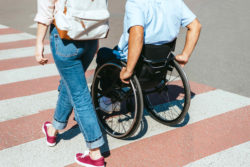 Have you or a loved one been involved in a Memphis pedestrian accident?
Have you or a loved one been involved in a Memphis pedestrian accident?
The physical and emotional trauma of such an event can be so injurious that the person that was on foot can enter into a state of shock.
Shock is a very dangerous state and necessitates immediate medical intervention. It is also a state that can be taken advantage of if the victim is asked to give statements to police, the driver, witnesses, or insurance companies.
What is Shock?
According to the website Medline Plus—associated with the National Library of Medicine—shock is a potentially fatal condition that happens when there is not enough blood supply getting to cells and organ systems with oxygen and nutrients necessary to function.
For every five people who go into shock, Medline indicates that at least one would die from this unfortunate state.
Medline also states that there are five different types of shock based upon the predisposing condition:
- Neurogenic Shock
- Hypovolemic Shock
- Cardiogenic Shock
- Anaphylactic Shock
- Septic Shock
The first three types primarily apply to a vehicle vs. pedestrian encounter. Neurogenic shock is caused by an injury to the central nervous system such as traumatic brain injury (TBI), and spinal cord injury.
Hypovolemic shock can be caused by low blood volume secondary to internal or external bleeding. While the latter would be obvious, the former might not be immediately apparent after a pedestrian accident.
Cardiogenic shock is caused from a heart attack, heart failure or other cardiac-related condition. If a pedestrian is already compromised with heart difficulties, the stress of a car hitting them can trigger a heart event and this type of shock. Anaphylactic shock and septic shock are related to a reaction to an allergen and an infection, respectively.
What Does Shock Look Like?
In the immediate aftermath of an accident, the extent of injuries—particularly if they are internal—might not be immediately visible. If the victim of a Memphis pedestrian accident goes into shock from those injuries, the color may drain from their face and they may act dazed.
Their skin may become clammy, and their lips and fingernails could take on a bluish tint, indicative of low blood oxygenation.
The key symptom that is most relevant here is “acting dazed.” A pedestrian victim of a car accident is at a severe disadvantage already when considering the mass and speed of a car.
On top of that, while insurance companies may seem like they have everyone’s best interest at heart, they are a business that is ultimately protective of the bottom line. They want to pay out as little as they can. Insurance representatives can seek statements from victims while they are in a compromised state which can then be used against them to reduce compensation.
Why Do I Need a Memphis Pedestrian Accident Lawyer?
Whether it was you or a loved one involved in a vehicle-on-pedestrian accident, you need an expert Memphis personal injury attorney that has the knowledge and endurance to stand up to insurance companies and fight to get you deserved compensation. You will need funds to pay for medical bills, funeral services, survival benefits.
The attorneys at Whitfield Bryson and Mason have the local expertise needed to help you through this traumatic event.
We at Top Class Actions know that hiring a personal injury lawyer following a devastating accident can only add to the stress you and your family are already facing. If you live in the greater Memphis, TN, area, we know you will be in good hands with our friends at Whitfield Bryson & Mason. Fill out the form on this page for a FREE consultation.
ATTORNEY ADVERTISING
Top Class Actions is a Proud Member of the American Bar Association
LEGAL INFORMATION IS NOT LEGAL ADVICE
Top Class Actions Legal Statement
©2008 – 2026 Top Class Actions® LLC
Various Trademarks held by their respective owners
This website is not intended for viewing or usage by European Union citizens.
Get Help – It’s Free
Get Help From a Memphis Personal Injury Lawyer
Fill out the form below or call to schedule your free no-obligation case evaluation now.
731-574-3412
Oops! We could not locate your form.












